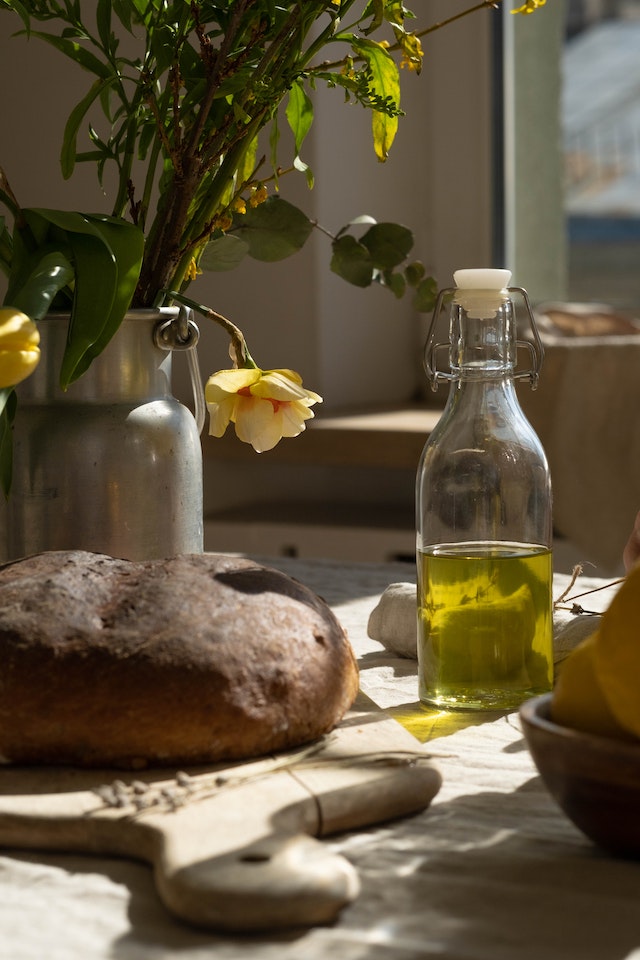Olive oil is not only a staple in the kitchen but also an amazing ingredient for your skin. This golden elixir has been used for centuries by Mediterranean cultures to enhance beauty and promote healthy skin. Olive oil contains antioxidants, vitamins, and fatty acids that can nourish and protect your skin from damage. However, with so many types of olive oil available on the market, it can be daunting to choose the right one for your specific skin type. In this blog post, we will explore the different types of olive oil and help you discover how to choose the best one for your unique needs. Get ready to learn how you can use olive oil as a natural remedy to achieve smooth, glowing skin!
Different Types of Olive Oil
There are several types of olive oil, each with its own unique flavor and aroma. The most common types are extra-virgin, virgin, pure, and light olive oil.
Extra-virgin olive oil is made from the first cold pressing of the olives and has a strong, rich flavor. It’s considered to be the highest quality of all olive oils because it’s minimally processed and retains most of its natural nutrients.
Virgin olive oil is also produced by cold-pressing but has a milder taste than extra-virgin. It’s slightly lower in quality but still contains many health benefits.
Pure or regular olive oil is a blend of refined and virgin olive oils that undergo heat processing to remove any impurities. This type has a lighter color and flavor than virgin or extra-virgin oils.
Light or mild-tasting olive oil is highly refined with little to no taste or aroma. While it may seem like a healthier option due to its name, this type actually contains fewer nutrients than other varieties.
No matter which type you choose for your skin care routine, make sure it’s labeled as “cold-pressed” or “extra-virgin” for maximum benefits!
How to Choose the Best Type of Olive Oil for Your Skin Type
Choosing the right type of olive oil for your skin can be a daunting task, especially with so many varieties available in the market. However, it is crucial to choose the best type that suits your skin type and needs. Here are some tips on how to select the perfect olive oil for your skin:
1. Extra-virgin olive oil: This is considered as the purest form of olive oil, extracted from high-quality olives through cold-pressing methods. It contains numerous antioxidants, vitamins and minerals that help nourish and moisturize dry or sensitive skin.
2. Virgin Olive Oil: This is also derived from cold pressing methods but has a slightly lower quality than extra-virgin olive oil due to its higher acidity levels. It works best for people with oily or acne-prone skin types as it has excellent sebum-regulating properties.
3. Pure Olive Oil: This variety undergoes more processing than extra-virgin or virgin oils but still retains some essential nutrients that enrich the skin’s texture and tone.
4. Light Olive Oil: While this may sound like a healthy option for weight watchers, light olive oils have fewer nutrients and are not recommended for skincare purposes.
When choosing an olive oil variant suitable for you, always consider factors such as purity levels, production process used and acidity levels among others to ensure optimal benefits for your particular skincare needs!
The Benefits of Olive Oil for Skin
Olive oil has been used for centuries as a natural remedy for skin care. It is packed with powerful antioxidants and anti-inflammatory properties, making it an excellent choice for all skin types.
One of the primary benefits of olive oil for skin is its ability to moisturize without clogging pores. This makes it ideal for those with dry or sensitive skin, as it provides deep hydration while keeping the skin soft and supple.
In addition to its moisturizing properties, olive oil also contains vitamins A and E, which help repair damaged skin cells. Regular use of olive oil can improve overall complexion and reduce the appearance of fine lines and wrinkles.
Olive oil’s anti-inflammatory properties make it effective in treating conditions such as eczema, psoriasis, and acne. Its gentle nature helps soothe irritated or inflamed areas on the skin without causing further damage or irritation.
Using pure extra virgin olive oil on your hair can also promote healthy growth by nourishing your scalp with essential nutrients like vitamin E. Simply massage a small amount into your scalp before bed then rinse thoroughly in the morning.
Incorporating olive oil into your skincare routine can offer many benefits beyond just hydration. From reducing inflammation to improving overall complexion – this natural ingredient has proven itself time after time when it comes to promoting healthy-looking skin!
How to Use Olive Oil for Skin
Using olive oil for skin is very simple and straightforward. There are numerous ways to incorporate it into your skincare routine.
One of the easiest ways is to use it as a moisturizer. Simply apply a small amount of olive oil onto your face or body, and massage it gently until fully absorbed. It can be used alone or mixed with other oils such as coconut oil or almond oil.
Another way to use olive oil for skin is by adding it to your bath water. This will help nourish and hydrate your skin while you soak in the tub.
Olive oil can also be used as an exfoliator when combined with sugar or sea salt. Mix equal parts of olive oil and sugar/sea salt, then apply on damp skin using circular motions before rinsing off with warm water.
If you have dry cuticles, rub some olive oil on them every night before going to bed for softening effects.
If you’re looking for a natural makeup remover, simply dab some olive oil onto cotton pads and swipe over the face to remove any traces of makeup without stripping away natural oils from your skin.
Olive Oil Recipes for Skin
Olive oil is not only a great moisturizer for your skin, but it also has many other benefits. It can help reduce inflammation and even out skin tone. Here are some delicious olive oil recipes that you can use to improve the health and appearance of your skin.
One recipe involves mixing equal parts olive oil and honey to create a hydrating face mask. Simply apply the mixture to your face and let it sit for 15-20 minutes before rinsing off with warm water.
Another recipe involves making an exfoliating body scrub by combining olive oil, sugar, and lemon juice. The sugar helps remove dead skin cells while the lemon juice brightens the skin.
You can also mix in essential oils like lavender or tea tree to further enhance the benefits of these recipes. These oils have antibacterial properties that can help prevent acne breakouts.
Incorporating these natural ingredients into your skincare routine will not only save you money on expensive products but also provide you with healthy, glowing skin all year round!
Conclusion
Choosing the best type of olive oil for your skin is crucial for its health and well-being. By understanding your skin type and the different types of olive oil available, you can easily incorporate it into your daily skincare routine. Whether you choose extra virgin olive oil or a more refined variety, this natural beauty elixir has numerous benefits that will leave your skin glowing and radiant.
Remember to use olive oil in moderation, as excessive application may result in clogged pores or greasy skin. Follow our tips on how to use olive oil effectively for optimal results.
Try out some of our recommended recipes and see which works best for you. With regular use over time, you’ll notice a significant improvement in the texture and appearance of your skin.
So go ahead – give your skin some love with nature’s wonder ingredient – Olive Oil!




